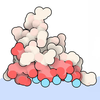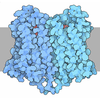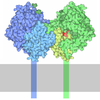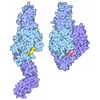Entry Database : PDB / ID : 3egkTitle KNOBLE Inhibitor Hirudin variant-1 Thrombin heavy chain Thrombin light chain Keywords / / / / / / / / / / / / / Function / homology Function Domain/homology Component
/ / / / / / / / / / / / / / / / / / / / / / / / / / / / / / / / / / / / / / / / / / / / / / / / / / / / / / / / / / / / / / / / / / / / / / / / / / / / / / / / / / / / / / / / / / / / / / / / / / / / / / / / / / / / / / / / / / / / / / / Biological species Homo sapiens (human)Method / / / Resolution : 2.2 Å Authors Baum, B. / Heine, A. / Klebe, G. / Muenzel, M. Journal : Angew.Chem.Int.Ed.Engl. / Year : 2007Title : KNOBLE: a knowledge-based approach for the design and synthesis of readily accessible small-molecule chemical probes to test protein bindingAuthors : Gerlach, C. / Munzel, M. / Baum, B. / Gerber, H.-D. / Craan, T. / Diederich, W.E. / Klebe, G. History Deposition Sep 10, 2008 Deposition site / Processing site Revision 1.0 Sep 30, 2008 Provider / Type Revision 1.1 Jul 13, 2011 Group Revision 1.2 Oct 9, 2013 Group Revision 1.3 Oct 25, 2017 Group / Category / Item Revision 1.4 Nov 1, 2023 Group Data collection / Database references ... Data collection / Database references / Derived calculations / Refinement description Category chem_comp_atom / chem_comp_bond ... chem_comp_atom / chem_comp_bond / database_2 / pdbx_initial_refinement_model / struct_conn / struct_site Item _database_2.pdbx_DOI / _database_2.pdbx_database_accession ... _database_2.pdbx_DOI / _database_2.pdbx_database_accession / _struct_conn.pdbx_leaving_atom_flag / _struct_site.pdbx_auth_asym_id / _struct_site.pdbx_auth_comp_id / _struct_site.pdbx_auth_seq_id Revision 1.5 Nov 15, 2023 Group / Category / chem_comp_bond / Item / _chem_comp_bond.atom_id_2Revision 1.6 Oct 30, 2024 Group / Category / pdbx_modification_feature
Show all Show less
 Open data
Open data Basic information
Basic information Components
Components Keywords
Keywords Function and homology information
Function and homology information Homo sapiens (human)
Homo sapiens (human) X-RAY DIFFRACTION /
X-RAY DIFFRACTION /  SYNCHROTRON /
SYNCHROTRON /  MOLECULAR REPLACEMENT / Resolution: 2.2 Å
MOLECULAR REPLACEMENT / Resolution: 2.2 Å  Authors
Authors Citation
Citation Journal: Angew.Chem.Int.Ed.Engl. / Year: 2007
Journal: Angew.Chem.Int.Ed.Engl. / Year: 2007 Structure visualization
Structure visualization Molmil
Molmil Jmol/JSmol
Jmol/JSmol Downloads & links
Downloads & links Download
Download 3egk.cif.gz
3egk.cif.gz PDBx/mmCIF format
PDBx/mmCIF format pdb3egk.ent.gz
pdb3egk.ent.gz PDB format
PDB format 3egk.json.gz
3egk.json.gz PDBx/mmJSON format
PDBx/mmJSON format Other downloads
Other downloads https://data.pdbj.org/pub/pdb/validation_reports/eg/3egk
https://data.pdbj.org/pub/pdb/validation_reports/eg/3egk ftp://data.pdbj.org/pub/pdb/validation_reports/eg/3egk
ftp://data.pdbj.org/pub/pdb/validation_reports/eg/3egk
 Links
Links Assembly
Assembly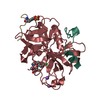
 Components
Components Homo sapiens (human) / Tissue: blood plasma / References: UniProt: P00734, thrombin
Homo sapiens (human) / Tissue: blood plasma / References: UniProt: P00734, thrombin Homo sapiens (human) / Tissue: blood plasma / References: UniProt: P00734, thrombin
Homo sapiens (human) / Tissue: blood plasma / References: UniProt: P00734, thrombin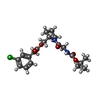




 X-RAY DIFFRACTION / Number of used crystals: 1
X-RAY DIFFRACTION / Number of used crystals: 1  Sample preparation
Sample preparation SYNCHROTRON / Site:
SYNCHROTRON / Site:  BESSY
BESSY  / Beamline: 14.1 / Wavelength: 0.91841 Å
/ Beamline: 14.1 / Wavelength: 0.91841 Å Processing
Processing MOLECULAR REPLACEMENT
MOLECULAR REPLACEMENT Movie
Movie Controller
Controller



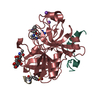
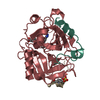

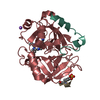
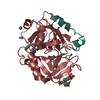
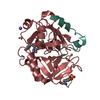
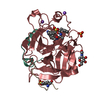
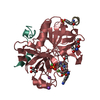

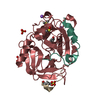
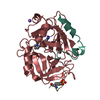
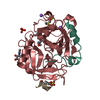
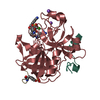
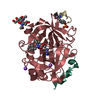
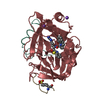
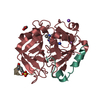
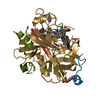
 PDBj
PDBj


